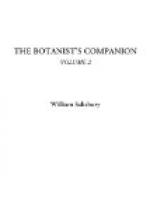Boerhaave frequently employed it, along with ammoniacum and galbanum, in hypochondriacal disorders, obstructions of the abdominal viscera from a sluggishness of mucous humours, and a want of due elasticity of the solids.
247. PIMPINELLA Anisum. Aniseed. The Seeds. L. E. D.-These seeds are in the number of the four greater hot seeds: their principal use is in cold flatulent disorders, where tenacious phlegm abounds, and in the gripes to which young children are subject. Frederick Hoffman strongly recommends them in weakness of the stomach, diarrhoeas, and for strengthening the tone of the viscera in general; and thinks they well deserve the appellation given them by Helmont, intestinorum solamen.
248. Pinus sylvestris. Scotch Fir. Tar, yellow Resin, and Turpentine. L. D.—Tar, which is well known from its oeconomical uses, is properly an empyreumatic oil of turpentine, and has been much used as a medicine, both internally and externally. Tar-water, or water impregnated with the more soluble parts of tar, was some time ago a very popular remedy in various obstinate disorders, both acute and chronic, especially in small-pox, scurvy, ulcers, fistulas, rheumatisms, &c.
Turpentine is an extract also from the same tree, which is used for various purposes of medicine and the arts.
249. Pinus Abies. Spruce-Fir. Burgundy Pitch. L. E. D.—This is entirely confined to external use, and was formerly an ingredient in several ointments and plasters. In inveterate coughs, affections of the lungs, and other internal complaints, plasters of this resin, by acting as a tropical stimulus, are frequently found of considerable service.— Woodville’s Med. Bot.
250. Polygonum Bistorta. Bistort. The Roots. L. E. D.—All the parts of bistort have a rough austere taste, particularly the root, which is one of the strongest of the vegetable stringents. It is employed in all kinds of immoderate haemorrhages and other fluxes, both internally and externally, where astringency is the only intention. It is certainly a very powerful styptic, and is to be looked on simply as such; the sudorific, antipestilential, and other like virtues attributed to it, it has no other claim to, than in consequence of this property, and of the antiseptic power which it has in common with other vegetable styptics. The largest dose of the root in powder is one dram.
251. Prunus domestica. French prunes. The Fruit. L. E. D.—The medical effects of the damson and common prunes are, to abate heat, and gently loosen the belly: which they perform by lubricating the passage, and softening the excrement. They are of considerable service in costiveness accompanied with heat or irritation, which the more stimulating cathartics would tend to aggravate: where prunes are not of themselves sufficient, their effects may be promoted by joining with them a little rhubarb or the like; to which may be added some carminative ingredient, to prevent their occasioning flatulencies. Prunelloes have scarce any laxative quality: these are mild grateful refrigerants, and, by being occasionally kept in the mouth, usefully allay the thirst of hydropic persons.




